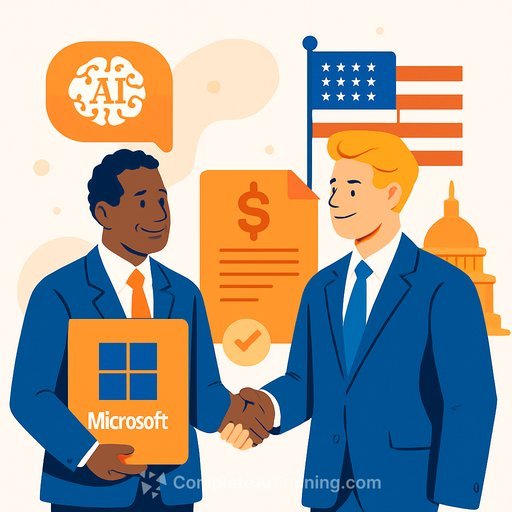Microsoft's OneGov Deal: Discounted AI And Cloud For U.S. Agencies
Microsoft is offering steep discounts to federal agencies across Microsoft 365, Azure, Dynamics 365, and Entra for up to three years. The headline offer: Copilot free for 12 months to Microsoft 365 government customers. The deal arrives through the General Services Administration's new OneGov agreement, placing Microsoft in direct competition with OpenAI, Anthropic, and Google as each pushes low-cost AI pilots into government.
What's Included
- Discounted Microsoft 365, Azure Cloud Services, Dynamics 365, and Entra (cybersecurity).
- Copilot at no cost for 12 months to eligible Microsoft 365 government customers.
- Microsoft-funded enablement: $20 million for workshops, classes, and online courses.
Projected Savings And Support
GSA estimates first-year savings of $3.1 billion. Microsoft projects more than $6 billion in total value across three years when you factor in services and support. The aim is clear: not just adoption, but deep operational use inside agency workflows.
Competitor Pricing Pressure
OpenAI and Anthropic are pitching models at $1 per agency per year. Google is touting its Gemini for Government platform at $0.47 per agency per year. Microsoft is countering with discounts plus a compliance advantage through existing FedRAMP High authorizations for Azure and Microsoft 365.
Why This Matters For Agency Leaders
Compliance and scale are Microsoft's edge. Newer entrants often depend on partnerships for compliance coverage, while Microsoft already operates at FedRAMP High for key services. That reduces friction for procurement, security reviews, and deployment pace.
The tradeoff is vendor dependence. Once productivity, security, and AI assistants sit inside one ecosystem, switching costs rise. As Peter Drucker would put it: build dependence on your strengths. Microsoft's strengths are breadth and compliance.
What Microsoft Is Saying
"For more than four decades, Microsoft has been privileged to support the U.S. government's most vital missions. Today, as we stand at the forefront of the AI era, we reaffirm our dedication to serving as a trusted partner," said Chris Barry, Corporate VP for U.S. Public Sector Industries.
Procurement And Program Guidance
- Clarify scope: define which workloads truly benefit from Copilot in year one (case work, grants, policy drafting, help desk).
- Start small, measure fast: run 60-90 day pilots with clear outcome metrics (time saved per task, ticket deflection, document turnaround).
- Budget beyond year one: model total cost once Copilot pricing normalizes, including licensing, storage, and support.
- Guardrails first: set data boundaries, prompt-use policies, human-in-the-loop review, and audit logging for sensitive workflows.
- Keep options open: require exportability, API access, and model-agnostic interfaces where feasible to prevent lock-in.
- Strengthen workforce skills: pair deployment with role-based training and scenario playbooks for analysts, caseworkers, and IT.
- Security checks: confirm FedRAMP High coverage for each service in use and map controls to your ATO.
Key Risks To Track
- Pricing uncertainty: Microsoft has not confirmed long-term Copilot pricing for government tiers.
- Overreliance: deep integration can limit negotiating leverage later.
- Model drift and bias: require periodic evaluations and red-teaming, especially for public-facing use cases.
- Data handling: ensure prompts, outputs, and logs follow agency retention, classification, and privacy rules.
What This Signals
AI is moving from pilot to utility inside federal workflows. Discounts are the on-ramp; integration is the destination. Whoever earns daily use across productivity, security, and data layers will set the standard for how agencies work.
Helpful Resources
Your membership also unlocks:






